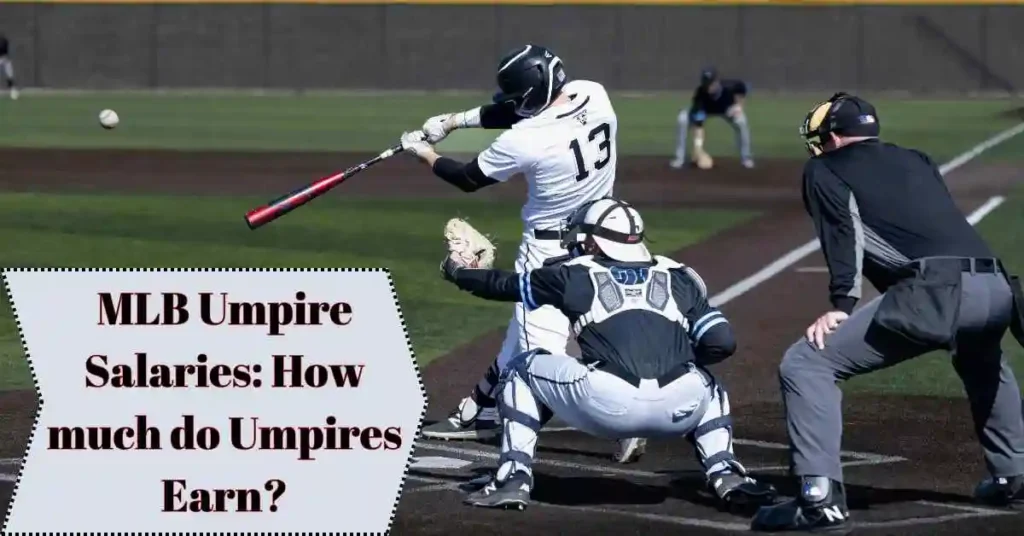
In Major League Baseball (MLB), an umpire is one of the most important contributors for the integrity of the game and how the game is played. As players are, umpires get paid for doing their jobs on the field. But many are intrigued about how much do major league umpires make and how their compensation stacks up to players or umpires in other professional sports. In this article, we’ll explore MLB umpire salary, including how much they take home per game, how pay varies by role, and the lowdown on some of baseball’s highest-paid umpires.
How Much Does A Baseball Umpire Make?
One of the first questions many people have when it relates to umpire compensation ishow much do umpires make. Major League Baseball (MLB) umpires are paid based on their level of experience, MLB umpire ranking and the number of games they are responsible for officiating.
Generally speaking, rookie umpires in the MLB can expect a starting salary of about $120,000 annually. Umpires can also earn full-time salaries. With time, earnings can yield impressive increases, culminating in veteran officials earning as much as $350,000 to $400,000 a year.Moreover, the total visits they officiate across the season is a significant factor in deciding their earnings. (Umpires are typically assigned to around 140 games in the regular season, but those working postseason games or the World Series can receive bonuses and extra pay.)
How Much Do MLB Refs Make?
This question comes up quite often: How much do MLB referees make? In Major League Baseball, refs and umps are nearly interchangeable. While referees in other professional sports, like those of the NFL or NBA, could operate on a different salary scale than their officials, it is safe to say that MLB refs are listed at the same pay level as umps. So, the pay range listed for MLB umpires also applies to the referees.
How Many Umpires In MLB Game?
The number of umpires at an MLB game differs depending on the situation, but usually, there are four during regular season games. An umpire calls the game from above the home plate, first base, second base and third base.
In special games such as playoff series or the World Series, six umpires may be assigned, working to provide more eyes on the action. More seasoned umpires are generally placed in more visible spots—like home plate umpires, who are charged with calling balls and strikes. MLB Ball Boys and Girls often assist with the game flow, ensuring everything runs smoothly for the umpires and players.

Angel Hernandez Salary | How much does Angel Hernandez Make?
Among the more famous umpires in the MLB is Angel Hernandez, who has made waves over the years due to media coverage. What is Hernandez’s salary? Reports say that Hernandez earns about $400,000 annually with a wealth of experience. Although he has been criticised in some quarters for controversial calls, he is among the most popular characters in the umpiring fraternity.
How Much Does A MLB Umpire Salary Per Game?
If you are wondering what the pay of an MLB umpire is game-wise, the payout value is usually divided depending on how many games they worked. An MLB umpire makes about $3,000 to $4,000 for every game. This number can be significantly higher for more important games, such as postseason games or the World Series, where pay and performance bonuses are typically more lucrative.
Salary for MLB Umpires:
The job that an MLB umpire does can also influence his pay. Umpires are paid at a lower rate during the regular season than they are in the postseason. When it comes to who works the playoffs or World Series, pay has generally gone up based on bonuses and extra pay for additional duties.
MLB Umpires Average Salary:
Most veteran MLB umpires make between $120,000 and $300,000 per season. This included the standard salary and bonus money for postseason games and other allowances and entitlements that are included in the umpires’ compensation package.
Salary For World Series Umpire: How Much They Earn
Umpires are compensated with bonuses to work World Series games, so the salary is significantly greater than for a regular-season game. The umpire pay for world series spark a debate among baseball fans. Umpires who work the World Series receive amplifying financial benefits also known as “world series bonuses” which rise between $20,000 and $30,000 based on the game stage. Instead of the typical umpire compensation per game World Series referees collect more than double this amount.

Top Salary in MLB:
Players secure the highest salaries in baseball but umpires reach significant compensations despite their role. According to current data umpire Joe West salary maintains the position of highest paid MLB umpire due to his annual salary exceeding 500,000 dollars.
Famous MLB Umpires:
The Major League Baseball world knows three prominent umpires who include Joe West and Angel Hernandez as well as Jim Joyce. The umpires receive fame both positive and negative because of their on-field calls. The professional position of MLB umpires brings them significant financial rewards and holds wide popularity among other members of the league.
Highest Paid Umpires in the MLB and Their Salaries provides further insight into the umpire salary structures and rankings of top-paid umpires in the league.
Little League World Series Umpires Pay:
While the pay of Little League World Series umpires is far less than that of major league umpires, the experience is no less rewarding. Little League umpires earn far less — often between $100 and $250 per game, depending on their position and region. But it is a stepping stone for many umpires wanting to work in the majors.
Conclusion
So, MLB umpire salaries are high and seprcially against most professional officiating jobs, for sure.They start with about $120,000, while umpires with years of experience earn $400,000 or even more, as with top officials like Joe West, who can make $500,000 yearly.
MLB umpires are paid top salaries baseball, given their contribution to making the game fair. With bonuses for postseason games and the World Series, the financial incentives can be hefty.
MLB Ball Boys and Girls have an essential role in ensuring the game runs smoothly, providing valuable assistance to both players and umpires.
FAQ’S
How much do Minor League umpires make?
The monthly compensation for minor league umpires varies between $2,000 and $3,000.
What is Angel Hernandez’s umpire salary?
According to multiple reports, Angel Hernandez makes around $400,000 annually as an MLB umpire.
Who is the highest paid mlb player of all time?
The highest paid player throughout Major League Baseball history belongs to Mike Trout. History records Mike Trout as earning the position of highest paid MLB player through his 12-year contract worth $426.5 million with the Los Angeles Angels.
How to become a MLB umpire?
The path to becoming an MLB umpire includes completion of a certified umpire school followed by participation in lower league games before getting chosen for the MLB Umpire Training Program.
How many MLB umpires are there?
There are usually four umpires in an MLB game, and in some memorable games, like the playoffs or the World Series, six umpires are utilised.
